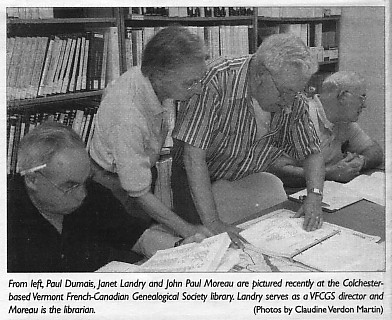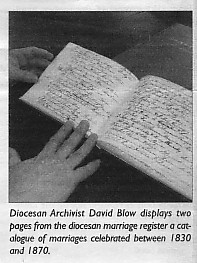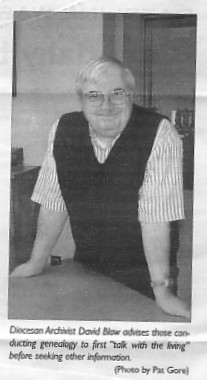Tracing family roots may mean digging
deep into parish records.
By Claudine Verdon Martin
Staff Reporter
BURLINGTON "Mommy, where did I come
from?" It's the question every parent anticipates, even plans for. And
boy, do you have all the answers.
But here's one that is not so easily answered: "Where did you
come from?" Not the biology of who you are, but your genealogy. Where did
you get those blue eyes, those curly locks and perhaps even your name? More and
more people are in search of the details of their family histories, finding the
experience extraordinary.
Steve Bean of Georgia is a relative beginner in the field of genealogy,
at the "data mining" level of research.
"I've
been researching for two years and I've got many more to go," he told The
Vermont Catholic Tribune a recent evening while conducting research at the
Vermont French-Canadian Genealogical Society library in Colchester. Thus far he
has traced his family name in some locations under the French spelling of
Lefebvre back to 1550, "I'm at the stage where I am just
collecting names," Bean added. "If I find some tidbits along the way,
I file them for later" Starting out the task of digging out your family
roots can appear to be overwhelming This is not a hobby for those who are short
of patience.

Pauline Benoit and
her husband, Wayne, of St George have been coming almost weekly for the better
part of five years to the Tuesday evening VFCGS library sessions. Mrs. Benoit said that she's currently
concentrating on establishing her full family line -- so far she has accumulated a 260 page notebook of genealogical
information.
Starting Points may be nearer than you think. Search through the family
Bible, where many people continue to record wedding dates, births and deaths.
Locate various legal documents including birth and death certificates. Once you
have gathered some of these basics you are ready to move onto the big league.

Diocesan Archivist David
Blow told the VCT that “until 1876 there was no law in Vermont requiring record
keeping." Yet, before
municipalities were formally organized, the Catholic Church had been keeping a
record of baptisms and marriages. Prior to the establishment of the Diocese of
Burlington in 1853, Blow noted that Father Jeremiah O'Callaghan traveled the
state on horseback and by stage coach to administer sacraments. The records
of those sacraments - in his own hand - have since been bound and are located
in the Diocesan Archives.
"What I have here," Blow said, gesturing to the two books,
"doesn't exist anywhere else." The marriage register - also indexed
by groom's name - spans 1830-1870 and the book of baptisms is July 1830 until
October 1858. These registers, he explained, predominantly catalogue
the records of Irish immigrants to Vermont because “by the time the
French-Canadians started coming here in the 1840s they had their own French
national parish in St. Joseph's." Now Co-Cathedral, the parish was founded
in 1850.
Blow recommends that researchers consult parishes where their
ancestors lived as each parish has records dating from its foundation. In
addition, he accepts queries from persons who seek information regarding
marriage or baptismal records from the mid-19th century.
According to Blow, the advantage of Catholic Church records over civil
records are that church records contain more information useful to genealogical
researchers like dates of sacraments and names of family members or other
witnesses present.

"Church records are crucial," Robert Quintin said.
"French-Canadians are so lucky because all the resources they need were
published in Church records." Quintin who was a featured speaker at the
Vermont French-Canadian Genealogical Society's Spring Workshop April 20 at St.
Michael's College, gave a presentation on reading French-Canadian parish
registers. He founded the Pawtucket, R.I. based Quintin Publications, which
publishes French-Canadian genealogical resources. His advice to novice
genealogy buffs is to join their local genealogical society, like the VT-FCGS.
"Societies like this one give you the best advice so you can avoid wasting
your time," Quintin said.
Founded six years ago in a classroom at St. Joseph School, Burlington, with a single filing cabinet, the society has grown into 230 members. The society's research library, located at Fort Ethan Allen, has three rooms of resource material and a volunteer staff available to lend a hand.
Paul Landry, VT-FCGS president, commented that among its diverse
resources the society has approximately 19,000 marriage records from Catholic
churches in Canada, in addition to baptismal and burial records. He encouraged
people to "verify, verify, verify" when it comes to conducting all
research, especially with online information. "It is very
rewarding," he said of his involvement with the society. "We are a
witness to people finding their ancestral line and learning more and more
about their families."
For additional Information on becoming a member of the VT-FCGS or how they may help you in your genealogical quest log onto: http://www.vt-fcgs.org . Queries for Diocesan Archivist David Blow may be directed to P.O. Box 489, Burlington, Vt. 05402-0489.
Finally, Archivist Blow advises those interested in genealogy:
"Talk to the living for goodness sake! Start with what you know and talk
to the oldest person in your family. Then you can begin doing your detective
work. The records will always be there, your family won’t.”